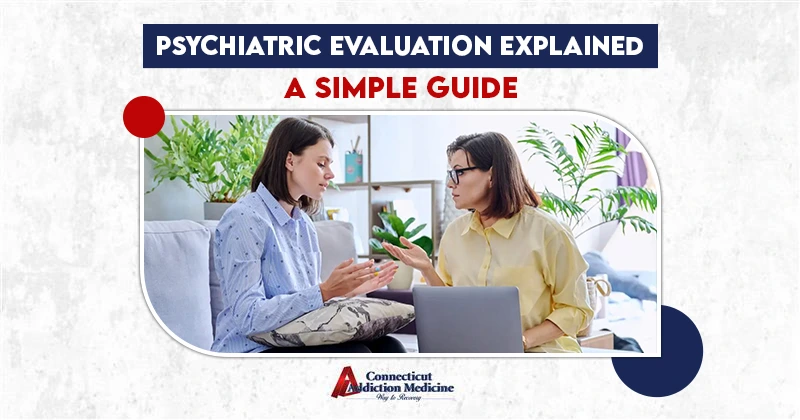A psychiatric evaluation is a careful process that allows physicians to understand what is happening with an individual. It is often the turning point into meaningful healing for many people.
At CT Addiction Medicine, we believe every patient deserves care, respect, and hope. A psychiatric evaluation is not just about finding a label.
It is about listening to a person’s story, understanding their struggles, and designing a plan that can bring real change.
Patients often discover that their pain is not just “in their head.” Instead, there are real reasons behind it, and there are solutions.
What is a Psychiatric Evaluation?
A psychiatric evaluation is a formal medical assessment where a psychiatrist assesses or understands a patient’s mental, emotional, and behavioral health.
It may sound complicated, but in simple words, it is a conversation with a purpose. The psychiatrist wants to know about sleep, mood, thoughts, past experiences, and even medical background. This helps them see the whole picture.
People often wonder, what is a psychiatric evaluation? It is the starting point of care. Without it, treatment can feel like guessing. With it, there is clarity.
Psychiatric Evaluation for Adults
For adults, the process often focuses on:
- Stress management and burnout
- Substance use and addiction patterns
- Relationship issues and emotional regulation
- Trauma from past experiences
A psychiatric evaluation for adults helps uncover the root cause of these struggles. Sometimes what seems like stress is actually untreated depression. Sometimes addiction hides deeper pain. With evaluation, the truth comes forward, and doctors can build an effective treatment plan.
At CT Addiction Medicine, many adults come seeking answers. The evaluation gives them understanding, direction, and hope for recovery.
Step-by-Step Process of a Psychiatric Evaluation
The process usually follows clear steps. Here is what happens:
Personal History
The psychiatrist asks about childhood, family, education, and major life events.
Medical Background
Health conditions and medications are reviewed
Mental Health Symptoms
Questions about mood, thoughts, sleep, and behavior.
Behavioral Observations
How the patient speaks, responds, or behaves during the session.
Testing if Needed
Sometimes psychological tests or lab work are included.
Diagnosis and Plan
The psychiatrist suggests a path forward.
How Long Does a Psychiatric Evaluation Take?
While children and adults may experience different timelines, the aim is accuracy. Being hurried can result in missing critical details because one moves too quickly.
At a careful pace, a complete patient understanding of the situation is much more manageable.
Psychiatric vs Psychological Evaluation
People sometimes confuse the two, but they are different. A psychiatric vs psychological evaluation comparison shows how they work together but focus on different areas.
Psychiatric evaluation
Done by a psychiatrist (a medical doctor). Focuses on mental health conditions, medication, and overall health.
Psychological evaluation
Done by a psychologist. Involves in-depth testing, assessments, and behavioral analysis.
Both are useful. In fact, many patients benefit from having both. The psychiatrist may handle medication while the psychologist provides therapy and testing.
Where to Get a Psychiatric Evaluation
If you are wondering where to get a psychiatric evaluation, there are many options:
- Hospitals and medical centers
- Private clinics and counseling centers
- Addiction recovery facilities like CT Addiction Medicine
CT Addiction Medicine provides compassionate and confidential services. Patients can get their evaluation without long delays, which is important when someone is struggling.
Benefits of a Psychiatric Evaluation
Here are the main benefits explained in simple bullet points:
- Provides clarity about mental health conditions
- Creates a personalized treatment plan
- Detects issues early before they worsen
- Reduces feelings of fear or confusion
- Helps families understand their loved one’s needs
- Opens doors to therapy, medication, and support
- Encourages healing and recovery from addiction
Psychiatric Evaluation Services at CT Addiction Medicine
At CT Addiction Medicine, psychiatric evaluation services are part of a complete healing journey. The doctors listen, ask questions with care, and build trust with the patient.
These services include:
- Detailed evaluation of mental health symptoms
- Substance use and addiction assessment
- Collaboration with therapists and counselors
- A full recovery plan that combines medical care and emotional support
What makes CT Addiction Medicine different is its patient-centered approach. Every evaluation is done with respect, dignity, and compassion.
Conclusion
A psychiatric evaluation is more than just a medical test. It is a gateway to healing.
The assessment will take time, but is worth it. History-taking, assessment, and review of treatment options will provide clarity. A patient won’t need to guess any longer why they feel a certain way, just real answers and real hope.
At CT Addiction Medicine we are committed to helping our patients through not only the assessment, but through treatment.
If you have asked yourself questions like what is a psychiatric evaluation or how long does a psychiatric evaluation take, the truth is, it is a process designed just for you.
A psychiatric evaluation can open a door toward treatment, peace, and better future.
FAQs
Q.What is a psychiatric evaluation?
It is medical review of mental, emotional, and behavioral health.
Q.What happens after the evaluation?
The doctor will recommend a follow-up, most likely therapy, medication, or counseling among follow-up options.
Q.Does CT Addiction Medicine provide psychiatric evaluation services?
Yes, with complete support and treatment planning.

